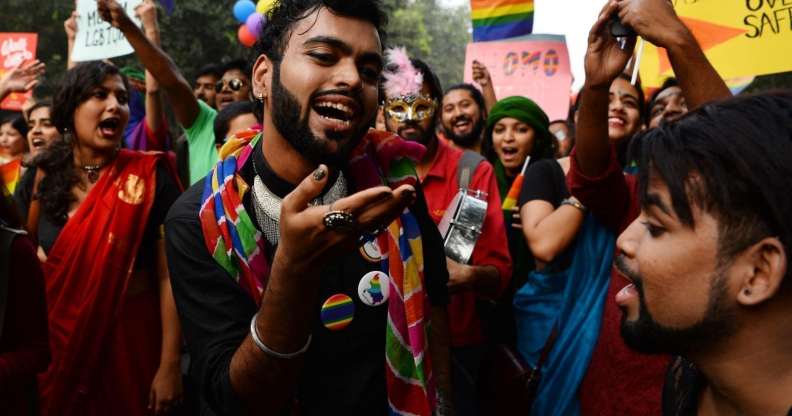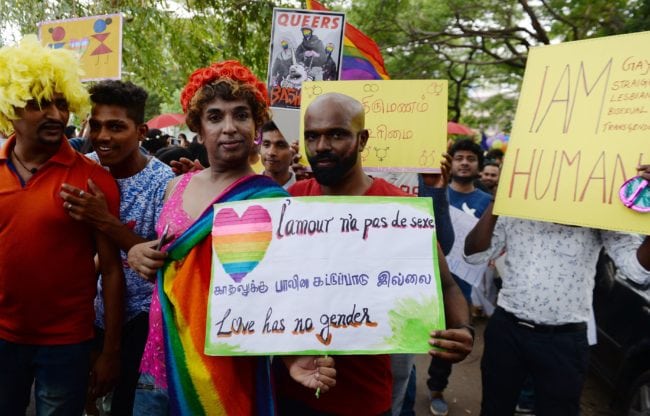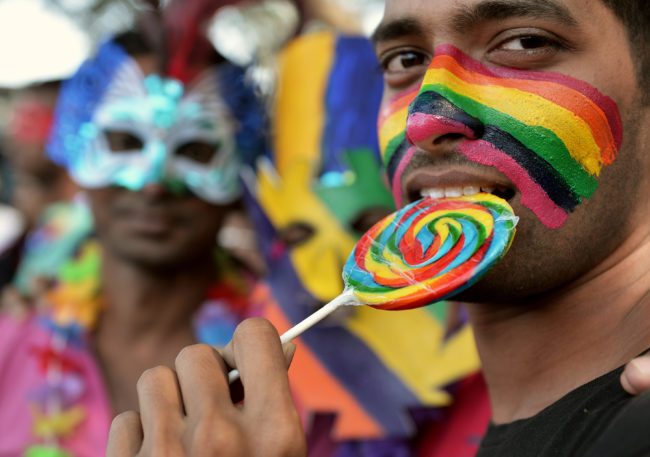India’s supreme court could decriminalise gay sex tomorrow

An LGBT pride parade in New Delhi in 2017 (SAJJAD HUSSAIN/AFP/Getty)
The Indian supreme court will reportedly issue its verdict on Thursday (September 6) in a landmark hearing to decriminalise consensual gay sex in the country.
Since July, the court has been hearing testimonies from celebrities and numerous petitions arguing for gay sex between consenting adults to be legalised.
Gay sex is punishable with life imprisonment in the country. It has been illegal in India since Section 377 of an 1861 law – introduced under British colonial rule – banned sexual activity “against the order of nature,” including with another man or woman.
In 2009, the high court in Delhi ruled that the1861 law violated human rights, and legalised homosexual sex between consenting adults.
However, in 2013, the supreme court reversed the hight court ruling – making gay sex illegal again – and outraging LGBT+ rights campaigners across the world.
It also meant that Indians, who had come out since 2009, were left open to discrimination.
In February 2016, the supreme court said it would reconsider its judgement, which is why the Supreme Court has heard this current case to decriminalise same-sex sexual activity.

LGBT+ rights campaigners at a Pride parade in Chennai on June 24, 2018. (ARUN SANKAR/AFP/Getty Images)
LGBT+ activists are hopeful that the supreme court will decriminalise gay sex following the hearing.
Anjali Gopalan, founder of the Naz Foundation, an NGO working to prevent HIV/AIDS in New Delhi NGO, which lodged the first petition against the 1861 law in 2001, previously told the Guardian that the moment “feels right” to overturn the ban on gay sex.
“The momentum has built up for this moment. We have a clutch of petitions from people from all walks of life. We have celebrities giving their personal testimony,” Gopalan said.
“Then we have had an important ruling recently by the courts upholding privacy. And we have seen a shift in recent years, more people coming out to take a stand. The gates have opened, as it were, and you can’t close them now.”

Gay sex has been illegal in India since 1861.(Manjunath Kiran/AFP/Getty Images)
The campaign for decriminalising gay sex also been bolstered by a supreme court ruling in August last year, which ruled that privacy, including a person’s sexuality, was a fundamental right.
Speaking to the Guardian,Suraj Sanap, the supreme court lawyer for this ruling, said: “The supreme court’s ruling on privacy last year was critical. It was a de facto overturning of its own earlier 2013 ruling against gay sex.
“That means there is really no leeway for the judges to argue otherwise than for gay sex to be legalised.”

